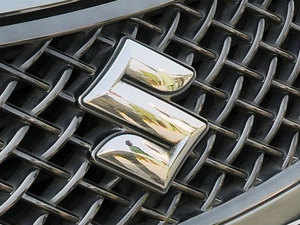 India’s largest carmaker Maruti Suzuki will start making its first affordable electric vehicle (EV) by 2020 based on technology from parent Suzuki Motor, ahead of products developed in partnership with Toyota.
India’s largest carmaker Maruti Suzuki will start making its first affordable electric vehicle (EV) by 2020 based on technology from parent Suzuki Motor, ahead of products developed in partnership with Toyota.
The company and its parent are focusing on in-house capabilities but are also looking for partners to put in place the ecosystem for electric vehicles, Maruti Suzuki managing director Kenichi Ayukawa told ET in an interview. The Japanese carmaker will not rely solely on its partner Toyota’s expertise to build EVs from the ground up.
“There is an MoU (memorandum of understanding) for technical support from Toyota to Suzuki Motor on EVs,” Ayukawa said. “In addition, Suzuki is also working on its own EV technology development. From these combined efforts, we will see EVs getting launched in India in 2020 and beyond.”
Maruti Suzuki executives said its first EVs will be based on Suzuki’s own technology. EVs from the collaboration with Toyota will come in after that. Suzuki concluded the pact with Toyota in November to launch electric vehicles in India, also around the turn of the decade.
Ayukawa did not specify details of the segment in which the Maruti Suzuki EV will be introduced.
First-mover Advantage
But the Maruti Suzuki MD emphasised that a detailed market survey is being conducted.
Maruti Suzuki is likely to have an electric vehicle with a power output of 25 to 35 kilowatts per hour, suitable for the compact car segment, and possibly priced below Rs 10 lakh, according to people with knowledge of the matter. To be sure, the EV made by Mahindra Electric has an output in excess of 35 kilowatts per hour and is priced at around Rs 11 lakh. “India is Suzuki’s largest market. With market share shrinking in Japan, Suzuki does not want to lose the first-mover advantage during this transition to greener vehicles,” said VG Ramakrishnan, managing partner at Avanteum Advisors LLP. “It has therefore decided to bring in electric vehicles on its own, even ahead of its partnership with Toyota.”
The company is looking for collaborations in the areas of materials handling, battery recycling and reuse besides charging infrastructure. “A comprehensive ecosystem has to be established,” Ayukawa said. This will include “component manufacturing, material arrangement… There is the safety aspect (also)… recycling, reusing (of batteries)… That is very difficult, not easy work.”
The company will continue to refine its internal combustion engines as well to make them more fuel-efficient and environment-friendly. In the best-case scenario, as many as 40% of new personal vehicles sold in the local market could be pure electrics by 2030. Assuming a growth rate of 8% in the passenger vehicle segment every year, around 71 million new vehicles are expected to be added between now and 2030, the company said. Of this, 14.4 million vehicles are expected to be pure electric and the remaining 56.6 million equipped with conventional engines.
“We have to improve electrification of vehicles, that is not only the pure electric vehicles but also other alternatives,” Ayukawa said. “We have to try to improve the fuel efficiency of vehicles and reduce pollution… I think hybrid is a very important technology (to address both concerns).”
